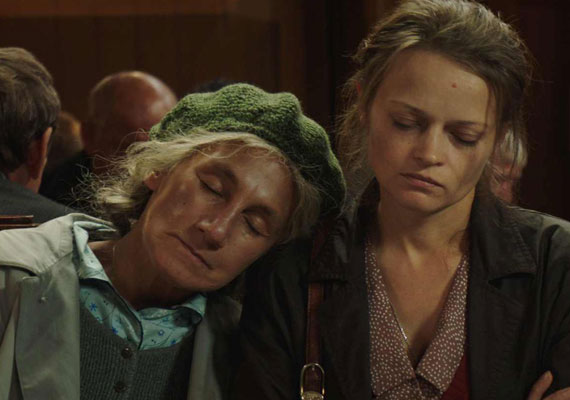CANNES FESTIVAL, “Krotkaya” (“A Gentle Creature”)
There’s something mildly sadistic about a master-filmmaker botching his own, brilliant, film with an underwhelming ending, such as that which Sergei Loznitsa did with “Krotkaya” (“A gentle creature” in the Russian original).
A woman whose husband is in prison gets the care package she’d sent to her husband returned to her. A delivery attempt was made, person is no longer at that jail cell. In want of news she sets off on a search for him, traveling to various outposts of Russia’s mail and prison services in a determined attempt to locate her husband.
“Krotkaya” was shot in Daugavpils, Latvia.
Sergei Loznitsa’s films are slow but there’s calculus-like rigor to how they’re shot. “Krotkaya” was entirely storyboarded, Loznitsa determining the length of each sequence from early on. The resulting film is paced so perfectly that it allows itself to be watched without effort, as if the images and the words flowed at you, in spite of the often dour personalities interacting on the screen, the heavy heart I felt because of the tragedy this woman is going through and the endless potential for disappointment that apparently comes from navigating Russia’s labyrinthine administration.
The characters in “Krotkaya” don’t express many emotions, the default mood being resignation and passivity. The gentle creature of the title (Vasilina Makovtseva) does that look well, but she has something else going for herself: a vulnerable, ethereal beauty that makes it look like anyone, whether it’s the prison guards that she has to negotiate with to get information about her missing husband or the stone-faced postal agent who wouldn’t say why the care package was returned, should have a go at her. And yet, this woman keeps at it, knocking on doors, doing a little screaming whenever needed but, mostly, calmly biding her time but also passively suffering with the others she encounters along the way, passengers on a train or people in a prison waiting room. In one scene she stands in front of the gates of the prison from which she was escorted out, silently, without moving, for a long time, until guards come out of it and take her for a ride in their 4 x 4.
I was entranced by this film, I wanted to know why it was so difficult to get news about her husband, what would happen next, when would she finally forfeit the mission and go home, and who were these people who she met on her way and what was their story, and did they, somehow, feel responsible for their own suffering?
MY FORECAST: Vasilina Makovtseva’s performance of quiet despair and passivity is resourceful enough as to warrant, I think, a BEST ACTRESS prize.
When she walks into the human rights mediator’s office on the prison’s grounds, a supervisor is dictating a witness report to an assistant seated in front of a computer. It’s about a rape, the witness describing in detail the medical exam that was administered to her, the procedure sounding about as painful as the rape itself. When it’s the gentle woman’s turn to speak, she sounds rushed, she explains the urgency of her request. Indignant, the supervisor, a little babushka, raises her voice. Haven’t you been listening? This other woman was raped, that’s a lot more urgent than your request! She then goes on on a teary-eyed plea about human rights. That’s when you realize, our gentle woman isn’t out of the woods yet.
It’s impossible to talk about the film’s ending for obvious reasons. But it bears saying that Loznitsa messed it up. There’s one dream sequence, which he himself has called the film within the film (and it is so, the lighting, people and context are completely different) which is much too long, relative to the film, but not relative to what takes place inside it. Also, what follows the dream sequence is at first shocking and strange, and then, the last scene, underwhelming. I’m not asking for all the questions to be answered at the end of “Krotkaya.” They don’t need to be. And the end of this movie isn’t supposed to wrap everything up neatly. And yet, I was left disappointed, “Krotkaya” an imperfect masterpiece.
Germany-based Loznitsa has made eighteen documentary films. “My joy,” a feature film, was presented in competition here in Cannes in 2010. This was Loznitsa’s first film to be presented during the Cannes Festival.
TRAILER, “Krotkaya”
news via inbox
Nulla turp dis cursus. Integer liberos euismod pretium faucibua




